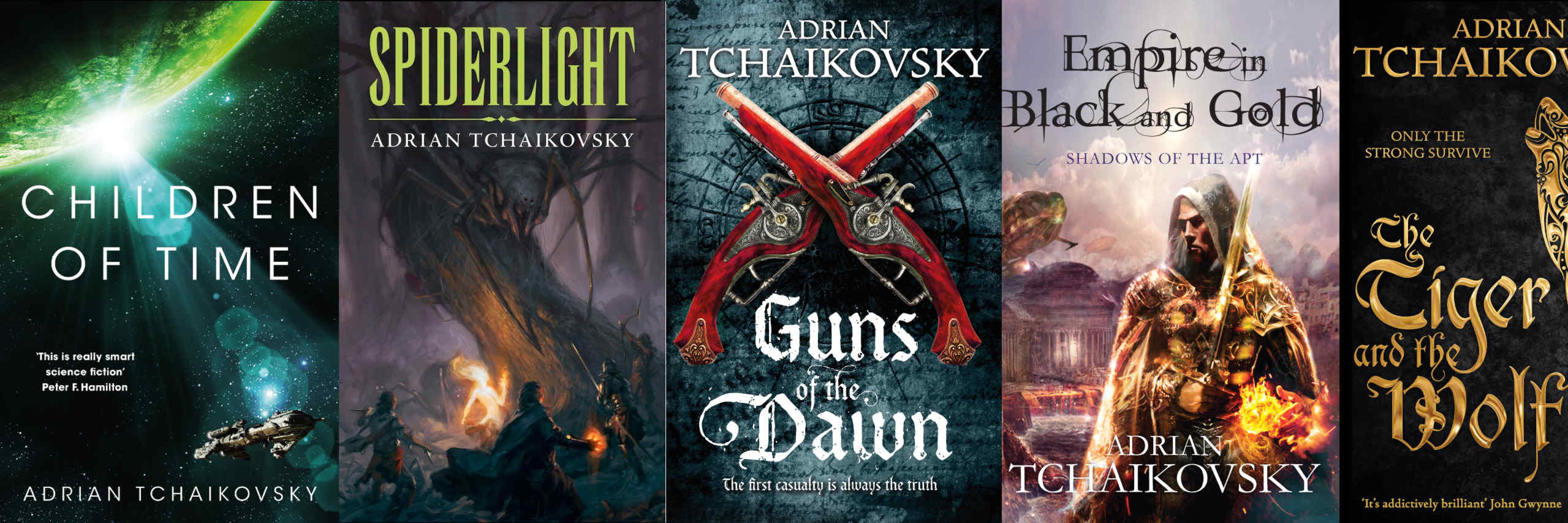
Adrian Tchaikovsky, On Tropes, Writing, & Children of Time
Spoilers: some elements of Children of Time, but no major plot spoilers.
The Doctor (TD): One of our interests at the EC is the intersection of different types of media, and I’ve heard rumours that you make use of role-playing games in your writing process?
Adrian Tchaikovsky (AT): I don’t really make use of them in my writing process, but Shadows of the Apt – my first series – is based on a role-playing game I ran in university. I’m trying to think if it goes any further than that – I think having a history of gaming has helped me inordinately as a writer for a number of reasons; and that’s probably closer to the mark.
TD: What reasons would they be?
AT: The majority of current fantasy writers, certainly that I’ve met, seem to be gamers; and I think one of the reasons that fantasy has gone into the current territory – that is to say, it’s very morally ambiguous, there are no pure good guys or pure bad guys, and there’s a lot more focus on the internal life of the characters – is because of gaming experience. If you look at the way that traditional player characters act, and how they interact with the world, it is very similar to that: they don’t tend to be your crisp Tolkienian heroes. Also I think running games and creating campaign worlds uses a very similar skill-set to world building for a book. It teaches you to pay attention to a lot of little details you mightn’t otherwise look at.
TD: Are you still involved in role-playing games?
AT: When I get the opportunity, yes. One thing I’ve started – just this year – I’ve run a number of little, one-off games at science-fiction conventions, which has worked out very well so far.
TD: Very cool. Speaking about the shift away from Tolkien-esque good and bad, there seems to be quite a lot of focus lately – in fantasy literature especially – on trope subversion, on doing something different to how we’ve done it before. What value do you think tropes possess in the creation of these kinds of texts? Are there any that you like to use, or any that you think we should just get rid of?
AT: It’s a fluid ecology, with tropes. If anything becomes over-used, if you’re saying it over and over again in books, then certainly from my perspective that’s something you want to give a rest to. I think ‘getting rid of’ is probably fairly draconian, because if it’s been out of circulation for a while, then it’s probably about time that it can be brought back and rejuvenated. For example, the most overused tropes – you’ve got the prophecy, and the magical quest McGuffin object – obviously a lot of these come from Tolkien, and Tolkien uses them in his own inimitable way, and then a lot of other people imitate that. And so you get scores and scores of, you know, ‘this young boy is the only person who can defeat the Dark Lord and it is prophesied’, et cetera, et cetera.
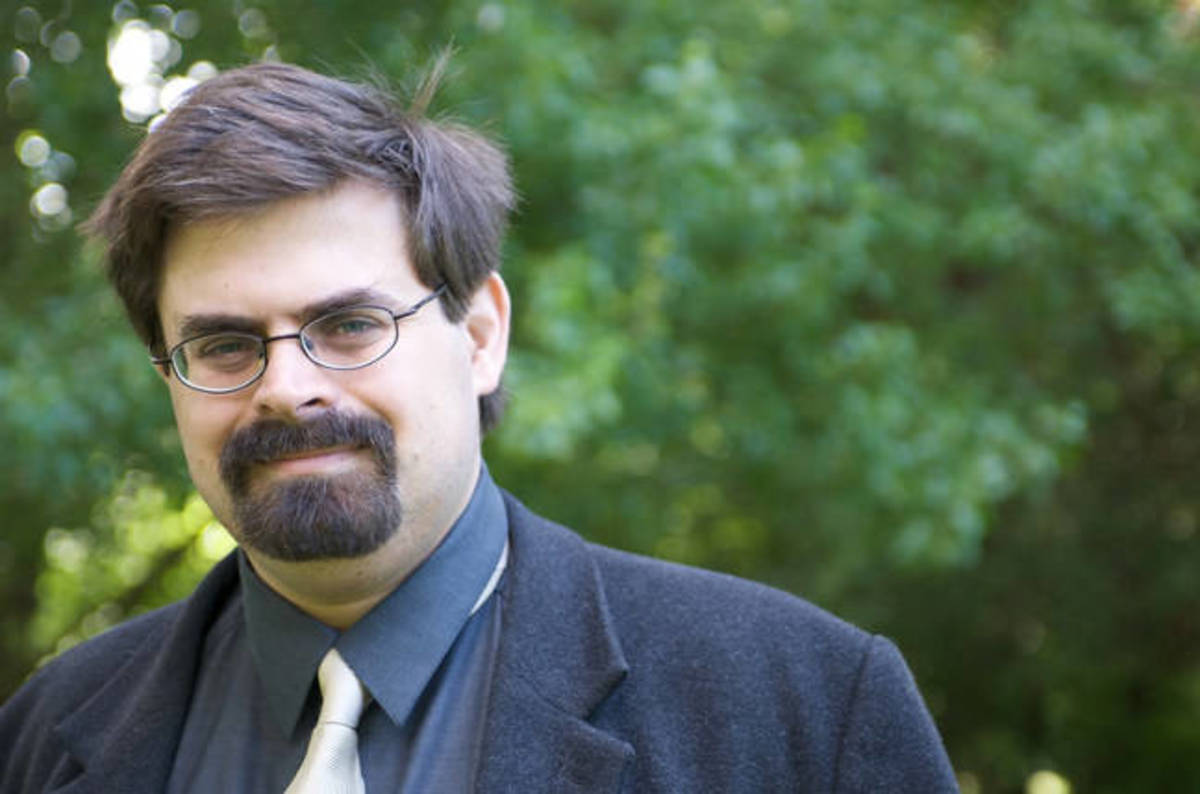
I prefer stories about heroes who actually earn and achieve their success, and who could theoretically have been anyone; rather than ‘everything devolves on this one person’. But obviously these are very popular things, so maybe I’m the minority with that. For me it seems to be reinforcing that ‘Divine Right of Kings’ sort of narrative which we’ve inherited from the Middle Ages, where it is only kings and princes that can achieve anything in the world, and everyone else is just an onlooker to the story of these – it’s the Great Men of History sort of thing isn’t it? Everything comes down to ‘if you’re this person, then you are allowed to do things’, and that person is almost always, of course, a man, and often of a certain social class. There are some fantasy stories where 75% of your group of heroes are all princes.
TD: Yes.
AT: [Laughs]. And that goes back to – you have the old Romance stories where everyone is a prince or a king, or at least a very high-ranking noble, and no one else is remotely important to the story.
TD: [Laughs] Which, you know, is very sad for all of us who want to be heroes of our own stories, and sadly aren’t princes.
AT: Well exactly.
It's a fluid ecology, with tropes.
TD: You mentioned prophecy there – how does prophecy feature in Spiderlight?
AT: Well Spiderlight is, and very very explicitly, a trope inversion in that sense. You have your traditional adventuring party and your traditional prophecy and as becomes apparent about midway through the book, the interpretation of the prophecy that the heroes have fixed on – that they need a giant spider to show them the way to defeat the Dark Lord – is by no means the only interpretation of the prophecy. They run into other religious sects who have a completely different view on what it actually means and, well, hilarity ensues.
I don’t want to spoil the book, so I won’t go into how all that comes out, but the nature of the prophecy as a way of driving the quest is given a fairly thorough and not particularly positive looking at.
TD: Excellent. You’ve mentioned spiders, there are also – and I don’t want to spoil anything about any of your books – but there are also some spiders in Children of Time. Why so many spiders?
AT: I used to have this very intelligent-sounding spiel about how insects and spiders were often used in literature as a mirror to the human condition, and so you’ve got Pelevin’s Life of Insects and you’ve got Metamorphosis and Capek’s Insect Play, and… it’s terribly impressive sounding, but it’s mostly bunk, because for reasons I can’t go back far enough to trace, I’ve always had a fascination with spiders and insects and things like that. I don’t have that instinctive loathing and revulsion that a lot of people seem to have. There’s – I don’t know if you know Penny Dreadful, the TV show?
TD: Yes!
AT: It’s one of the finest TV series I’ve ever seen, and it has this introductory sequence in the credits which is full of scorpions and spiders and things like that. It’s obviously intended to instil a sense of dread, and to me it’s entirely the opposite, I find it all really terribly pleasant.
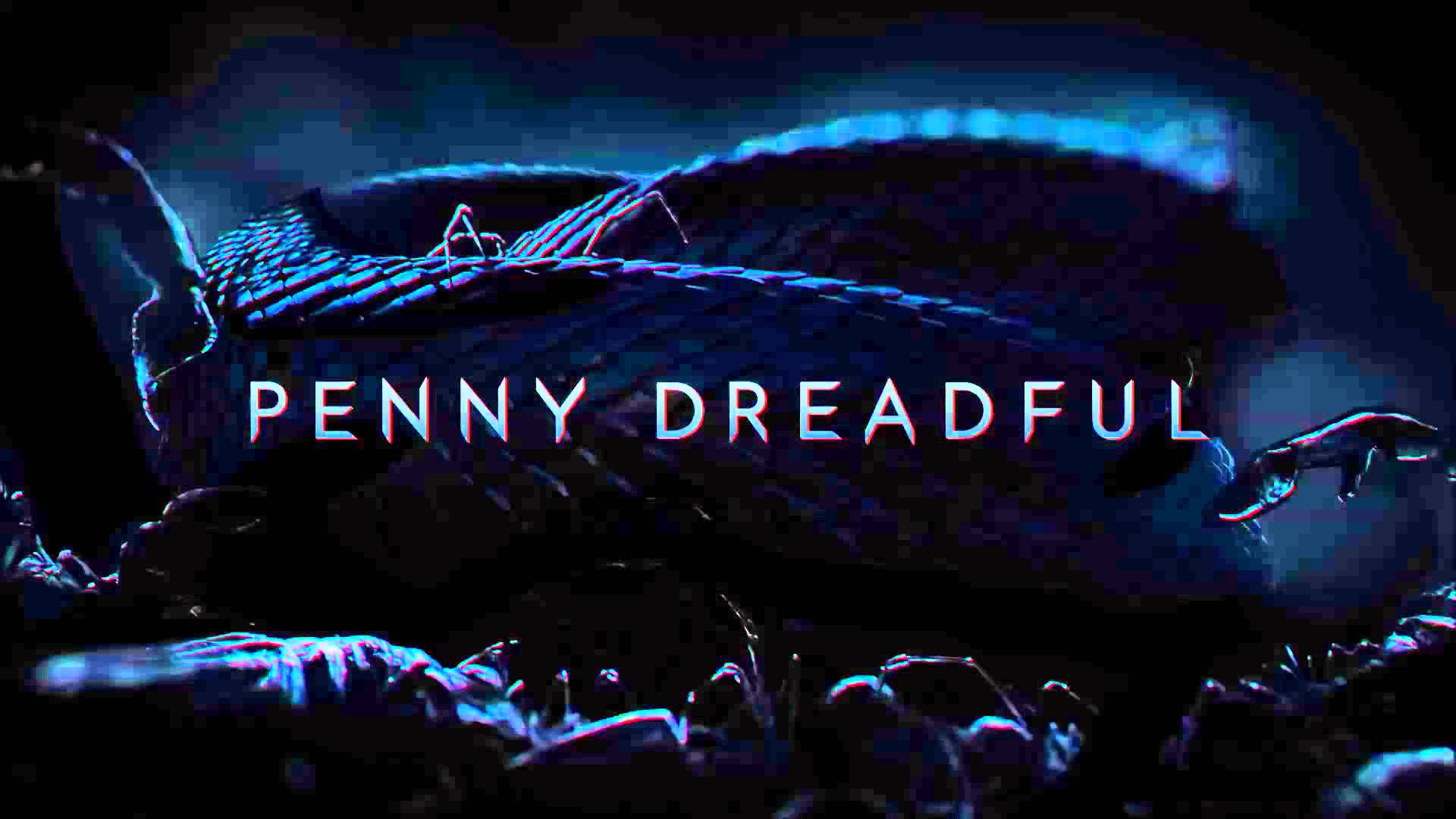
It’s not really a spoiler that there are spiders in Children of Time, especially for anyone who knows me and knows my work, but it is kind of an open secret now from various reviews. One of the nice things about that is – for example, one of my closest friends is quite arachnophobic, and he’s read Children of Time and was very much able to associate with the spider characters – a lot of people who don’t like spiders have said to me that it has helped them a little to see them as something other than objects of fear. Which is nice!
TD: That was certainly my experience, I mean, I must admit, I got a bit teary at the end of Children of Time,
[Adrian laughs]
TD: Which is a bit ridiculous, but you painted them as creatures of great empathy, which was a bit of a head-spin for me. Especially coming from Australia, where most of them will kill you.
AT: [Laughs heartily] Well yes, I’m used to being in the UK, where that’s…
TD: Less of an issue.
[Adrian continues laughing at TD, quite rightly]
TD: So on the spider front… now obviously I’m a philosopher, so some of the next questions are based on philosophically interesting points, and I’m interested in how they came about. So speaking of the spiders: early on in the book, on page 21, you first introduce Portia, and you say:
‘Portia has no thoughts. Her sixty thousand neurons barely form a brain…’
And then you go on to describe her using verbs we would usually associate with thought, things like recognising her enemy, playing with the edge of the web, working out and planning her approach, and I think the thing that’s most interesting for me: that she knows her enemy’s spit would prove fatal.
Do you think there’s a tension between those two ideas?
AT: There is, and effectively it’s a real world tension: it is perplexing to zoologists (in this particular case). Spiders have very little grey matter, so to speak, and yet, this particular spider’s behaviour is every bit as complex as I’ve described in that chapter. It certainly seems to us – as thinking creatures – that there is thought going on.
And yet at the same time that contradicts everything we know about the equipment required for that thought. So obviously it’s possible that the recognition I’m referring to is somehow just an extremely sophisticated kind of cause-and-effect, instinct, and in most cases it would be written off as just that. But the behaviour is so complicated and sophisticated in this case that it is extremely hard to explain, especially because there’s a lot of complex problem solving going on, for example with the spatial mapping and the object permanence issues that I brought up there.
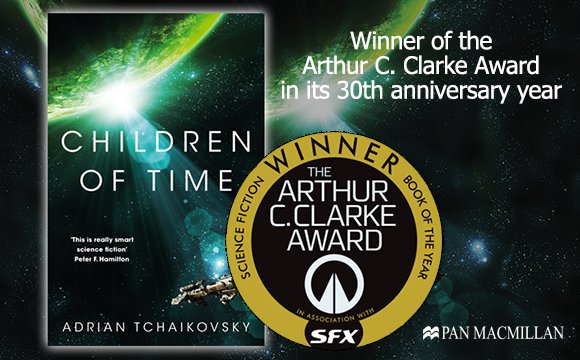
TD: This feeds in to a theme I noticed throughout the book – and it’s one I really like – a kind of functionalist theme: as long as something behaves in the same way or does the same thing, we should just call it by the same name. That’s what matters, not what it’s made out of. So we see that the planet’s inhabitants have organic equivalents of human tech, things like radios, and in such cases you call them by that human name – like a radio – which despite…
AT: Well, that’s actually one of the examples where it’s not an organic equivalent. Certainly what they’re doing at the beginning when they’re picking up the signal with the radio is very much like the sort of wireless set my dad used to build.
TD: Sure, I meant towards the end when [spoiler redacted]
AT: Oh yeah, sure. And elsewhere, because of their different sensorium and the different trajectory their tech takes, they end up solving problems that we would use mechanical means for by biological and biochemical means because those as the tools they have and can manipulate.
TD: So, another example then, take the consciousness of Dr Kern, whose location (or what constitutes that consciousness) changes from an organic thing to an organic + artificial thing, and then later on is more distributed. What inspires that kind of approach? What ideas do you have about the mind? Do you think she’s the same person across time? [Editor's note: in hindsight, this was a lot of questions in one breath]
AT: I think she’s not, but she doesn’t realise she’s not. The thing with Kern is, she’s got a dichotomy of identity. There’s her, and then there’s…
TD: Eliza.
AT: …which is a more true Artificial Intelligence which has semi-merged with her (at the time for a very specific purpose, but then she’s in that state way longer than was ever anticipated and so the boundaries become very indistinct). There is a thought experiment: you have the two halves of the brain, and you can – as I think was done for epilepsy at one point – sever the connection between the two halves. The thought experiment is: what if you had some sort of computer between the two halves of the brain, which effectively acted as a relay station for all the communication. And therefore, it would get all the thoughts going through both sides of the head and would be able to insert things. You as the effective owner of the brain wouldn’t realise, because all of your communications between the two hemispheres are going backwards and forwards through this relay.
Eliza is kind of in that position, and so you get that merging, until it’s not entirely clear what is originating in the brain and what is originating in Eliza. Eventually you get to the point where Kern tries to check up on Eliza and finds out that what she’s checking up on is Kern, and the thing that thinks it’s Kern is Eliza. So she’s obviously not the same, but then there are problems when she tries to access memories of who she was as well. She’s not the same, but there has been a seamless transition.
And the other thing I’m looking at there is that we have, as human beings, the incredible ability to fool ourselves and to rationalise things that have happened to us; so that whatever may have changed or been lost has effectively been smoothed away in Kern’s consciousness. Even when she is in her final form, which is radically different, and presumably offers radically different abilities, she is effectively telling herself that there is that continuity, and believing in her own narrative.
TD: I’m going to be mulling all that over, as there’s a lot there that’s really interesting. But moving on slightly, to a similar question insofar as it feeds off this changing identity business. There’s this fabulous juxtaposition in the novel between the time lapse for the humans, and the generational narrative for the planet’s inhabitants. What were you trying to achieve with that?
AT: To a certain extent it was just a plot necessity – I needed the spiders to evolve, and even with the nanovirus as a kind of McGuffin to allow that evolution to happen way faster than it actually would, it still requires the humans to be kicking their heels for a very long time. I could have conceivably had the evolution happen and then the humans arrive, but I think I gain a lot narratively from being able to link the sections in real time, rather than just having flashbacks to the evolution (which I think would have been a bit of a cumbersome device).
Originally I was going to do the whole thing with time dilation and have humans travelling at near-light speed, and unfortunately the mechanics of that and the energy required ruled it out for the sort of human civilisation I was looking at.
But I gain colossally from having at least Holston Mason coming in and out from hibernation, because you get that wonderful kind of disjointed punctuation, where everything has changed every time he comes out.
TD: Which is fabulous. One thing I really liked about it, is you’ve got the changing (this isn’t a question, this is just a comment, sorry), perspectives every chapter, and so often when you have a changing perspective in a novel you think ‘oh, I was really enjoying the previous bit, I’ll just put the book down now’, but I couldn’t do it! Every time I was really into the new story within half a page of the next chapter.
AT: Good, good.
TD: You mention the restrictions on the technology that the humans would have. How important was it to you to have the tech be scientifically plausible?
AT: I did my level best. What I think that comes down to is that the technology is hopefully plausible for someone who knows slightly less about the science than I do.
[TD laughs]
AT: For people who know more… I’ve already been brought up I think on one thing – something to do with the travel speeds and travel times – so there’s always someone who knows more than you, and there’s always a limit to how much research you can do. I did have a dialogue going on with some physicists, and I went down to the entomology department at the Natural History Museum and spent a day there, discussing the various ramifications of having, basically, giant spiders.
TD: Fantastic.
AT: And gained a lot of incidental stuff that then went into the book, just purely from what people were discussing at the time.
...academics also have a use in inspiring the creation of works in the first place.
TD: So on the collaborative front – doing research and seeking out information – we often see academics deconstructing texts after they’ve been written, coming along and reviewing them, or teaching them. Do you think there’s a role for academics in the production of fantasy and sci-fi?
AT: As a writer, you never know what you’re going to need to know, and quite often the most efficient way of getting on top of a subject is to find someone to talk to about it. Because even if you decide ‘well I will read some books!’, it can be very hard to track down precisely which are going to be the best books or papers to go through.
I think academics also have a use in inspiring the creation of works in the first place. The whole of Children of Time comes out of me reading some papers and articles about the Portia Spider, so that research was the entire impetus for the book.
TD: Back to the spiders, since you’ve just mentioned them again: I really liked the continuity of names across generations. Why do it that way?
AT: It’s useful because it stops people getting confused. Quite a lot of the reviews have basically said that it helps you continually associate and empathise with the spider characters, whereas if they had different names each time you’d be relearning a new cast. There isn’t, really, so much a continuity of personality as some reviewers have thought, because my rule of thumb was actually that the first spider you run into is Portia, and then effectively there’s Bianca, and then the male spider is always Fabian…
The other thing is that the names are obviously entirely a convention of me as a writer, because the spiders have a completely non-auditory language, and so they’ll have names, but the names will not be anything that could possibly be written down. So using names is a necessary evil at that point. I think that if I’m using the same names over and over again, it’s obviously a device, whereas if I’m giving each one individual names, it starts to feel like I think they have human names.
TD: Yeah, I get the pragmatic side of it, that makes perfect sense. I did find it interesting though – and maybe this is me reading too much into it – that, when we give somebody the same name over time, it’s usually because we recognise them as the same creature over time. And as you rightly point out, there are quite different personalities across the different spider generations, but also, as the human characters wake up and go back into cold sleep, they don’t wake up exactly the same. With the situation they find themselves in, especially from the protagonist’s point of view, they seem like drastically different people. So as a reader, I almost felt that, just as I was meeting each new generation of spiders, I was meeting each new incarnation of the human characters; that was a nice symmetry.
AT: Yeah. I think Holston, who is the protagonist, changes least because he is active least, so he is the one who is constantly coming to the new situation the other human characters have created. So you’re seeing the other characters change under the necessity of whatever is going on in the ship, or whatever some of the other characters are doing. And you get to see some of them rise to the challenge, and some of them fail to do so.
TD: [Laughs], yes. So one more question about spiders: you did some interesting things with gender and the planet’s inhabitants. On the one hand that looks like, politically, a really interesting subversion; on the other hand, it seems to be motivated – or at least on the account you get from the spiders, it is motivated – biologically: that the females are bigger, that they have certainly biological urges. That’s potentially worrying if we extrapolate it to humans. Were you trying to make a point? And if so, what was the point?
AT: I think that if I hadn’t gone there, it would have been a very glaring omission. So obviously with real-world spiders in most cases the females are considerably larger, and famously various species may or may not devour males. I understand that currently that’s a matter of some scientific controversy, because apparently they may just devour males when they’re being kept in a small tank cage by scientists.
[TD laughs]
AT: So I don’t actually know the full truth of that, but certainly the females tend to be larger, and more aggressive. And so you get the situation where spider males end up in a very socially submissive situation – it kind of goes from ‘well they get eaten’, to they simply get discounted. They get treated in ways that are similar to the ways that women have been treated historically: there were times that women couldn’t vote, and weren’t allowed to own property, and were scientifically believed to be incapable of certain kinds of thought. That’s the sort of thing I’m riffing on with the way that the males are treated, except they also might occasionally get eaten.
And so, yes, that is a very definite political thing, but it also seemed a logical way that the society would develop. And I appreciate that evolutionary explanations for social phenomena are very fraught to go into, so I’m not necessarily saying ‘people are like this because of the way we evolved’. Although interestingly, one of the reasons it seems to me most fraught is that it is then used as a justification for why it should be perpetuated, which is certainly not something I’m doing, as you can see from the way things go in the book.
TD: Exactly. And that is actually one of the most hopeful things about the book, I think, that the more civilised we get, the better we treat other people.
AT: It would be nice to think so, anyway. [Laughs]
TD: If we think fiction can teach us lessons, I think that would be a lovely lesson to learn. A less fraught question: you mention the Prisoner’s Dilemma in Children of Time. How would you respond in a prisoner’s dilemma, should you be put in one?
AT: I really don’t know. The classic prisoner’s dilemma, like a lot of those kind of thought experiments, is obviously a very artificial thing. And when I use it, when the scientist character brings it up, she is massively misquoting it.
TD: Yes [laughs], I enjoyed that.
AT: Yes, and one of the things that they’ve got there which you don’t have in the prisoner’s dilemma is an avenue of communication. The key point with the prisoner’s dilemma – the thing that makes it so difficult to call, and effectively so artificial, is that you have absolutely no communication and you have no knowledge of the other prisoner. Let’s say you had a real life prisoner’s dilemma, where two thieves have been caught, and each is wondering whether they would rat out on the other: they would at least have some knowledge of the other individual to base their decision on. But in the classic prisoner’s dilemma, you’re effectively complete strangers with no backstory or background at all.
TD: So you’re not optimistic enough to think, ‘oh, I’d just do the right thing’.
AT: I think we’d all like to think that, but I think that realistically, it would be very difficult, if you were suddenly captured by aliens and put in that logic trap.
...you can find the mountain peak that is ‘peak sci-fi’, and... somewhere off in the distance there is a peak which is ‘peak fantasy’
TD: Fair enough. So, I have two more questions, if that’s ok?
AT: Yeah, sure!
TD: The first thing is: there is science in your fantasy novels, so what makes Children of Time different? The broader background for this is: do you think there’s a clear-cut distinction between fantasy and sci-fi?
AT: It’s a tricky one. It’s one of those perennial favourites for convention panel topics. Just last week at a convention I was on the ‘Does genre matter?’ panel…
TD: Ah, I’m sorry to be derivative!
AT: No, no, no, no, no! That one was more of a genre v mainstream focus, but one of the things I said on the panel was that it’s basically a morphospace. There’s a terrain, and the terrain is real, but the borders drawn on the terrain aren’t necessarily real. So I think that you can find the mountain peak that is ‘peak sci-fi’, and that somewhere off in the distance there is a peak which is ‘peak fantasy’. You can travel from one to the other, and there is going to be a large disputed border land in between, and that’s where, for example, you used to get a lot of science fiction books which were ostensibly written as fantasy. So for example, The Book of the New Sun by Gene Wolfe very much comes over as a fantasy narrative, but behind it there is a lot of extremely complex and well-thought-through science.
And then you have something like Anne McCaffrey’s Dragon Riders, which was originally a fantasy idea, and because of the way that science-fiction was selling at the time it was rejigged by Stewart and Cohen – the two guys who would go on to do Science of the Discworld – as a science-fiction setting. So they basically gave it a scientific underpinning, which – if you want to go back a few questions – that’s another way that academics can and have come into genre writing. For me, I think that one of the things that marks science fiction out against fantasy most is a certain analytical context, of things having an explanation which can actually be broken down and discovered by the characters in a way that, with fantasy, it’s not really the priority of the book to do that. Although having set that, I’m currently reading The Obelisk Gate by N. K. Jemisen, which is…
TD: Me too!
AT: Oh, splendid! One of the things I love about that is the way that characters are genuinely and scientifically trying to work out what’s going on and how the world works.
There’s another thing which is not really a defining difference, but a lot of fantasy is quite circular in the way its plots work, so that you end everything kind of how you began it: everything’s lovely, Dark Lord turns up, Dark Lord is defeated, everything’s lovely. Whereas a lot of science fiction has more of a ‘time’s arrow’ kind of plot, where you’re going forward to discover a kind of a thing, or invent a thing, and the universe at the end is different to the way the universe is at the beginning. One of the things I was trying to do with Shadows of the Apt, my fantasy series, was give it that science-fiction sense of forward motion, so you get a very quick ramp-up of technology and a lot of political change. It is not simply a matter of restoring the One True King at the end of the series.
TD: And finally, if anyone’s reading this interview who has never read any of your work, if you could get them to read one particular thing first, what would it be?
AT: That depends what they like. If they like science-fiction, it’s going to have to be Children of Time, because although I’m working on more of it, currently none of it is in print. If they are more of a fantasy fan, while Shadows of the Apt is probably always going to be my magnum opus at ten books, that in itself may be enough to put off people who don’t know my writing. So I would say either Spiderlight or Guns of the Dawn for that, because they’re both standalone books and fairly easily accessible.
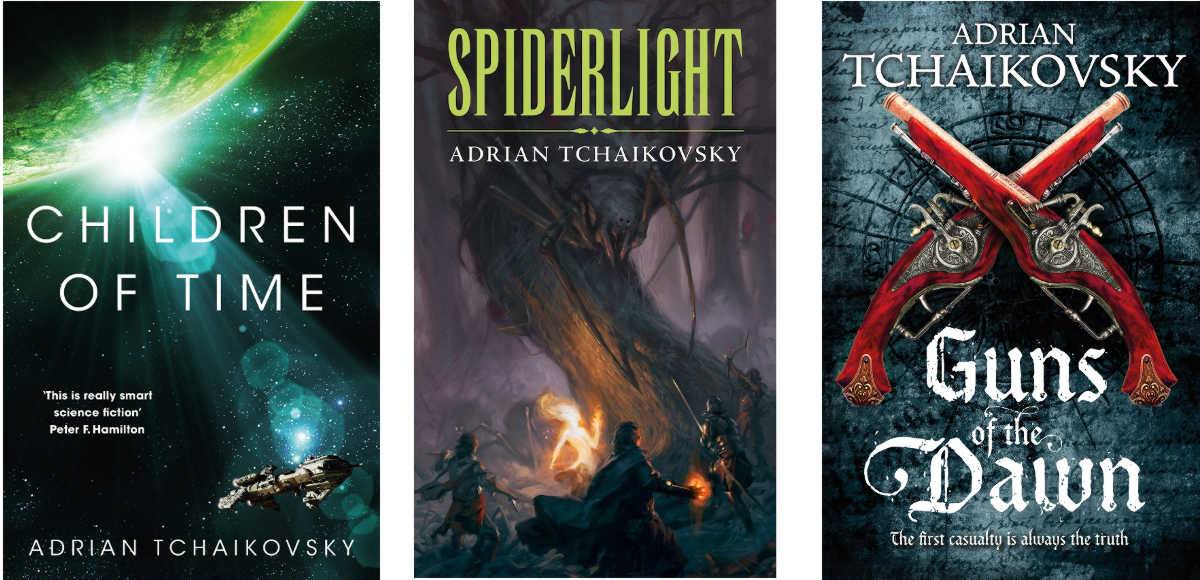
TD: Excellent. Thank you so much for this, it’s been really informative, and makes me want to go off and read Children of Time again!
[Adrian laughs, and thus we end.]
1 comment
I do like the morphospace concept for genre fiction. Rather than trying to divide stories into either camp, better to think of them as a an unequal mix of parts from both fantasy and science fiction.
As someone who works with morphospaces in their day job, I feel a bit embarrassed that the idea has never occurred to me.